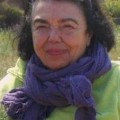Opal Dunn
Opal Dunn co-founded the first International Children’s Bunko in Tokyo in 1977 to support and encourage ‘international’ children who have a knowledge and understanding of other countries’ language and culture.

I was privileged to stay in Tokyo for nine years in the 1970s. This gave me time to bond with Japanese who understood my passion to help young children reach their, often underestimated, potential to pick-up languages and explore their cultures.
I clearly remember my first dialogue in Tokyo about young children in 1972, when Nursery School Education academics, mostly men, invited me to the Celebration of 100 years of Japanese Nursery School Education. There I learned to my surprise that the roots of Nursery Education in Japan came from a German lady, Bertha Titleman, trained at the Froebel Teachers’ College in Berlin. She, together with a Japanese German-speaking professor, opened the first (Froebel) Nursery School at Ochanomizu. To these academics’ amazement, the roots of British Nursery Education also came from Froebel brought to England in the 1850s by German ladies, who later founded the Froebel Education Institute, where I had been trained initially. From this shared link grew a supportive interest in my passion.
Living in Kagurazaka, then a Japanese neighbourhood, I soon met International Japanese families, who had lived overseas on assignment and whose kikokushijo—(returnee children) spoke native-speaker English. Mothers (children’s first language teachers) told me about their young children’s academic and social re-entry problems into Japanese Elementary Schools and asked my advice on how, within Japanese monolingual society, they could keep their young children’s English fluency. I easily empathised with them as my young children had lived in three Asian countries with short intervals in London and, as planned, were unconsciously absorbing three languages.
The future wealth of any nation lies in their children and I realised that these kikokushijo, like my own, could all grow-up to be valuable mediators between peoples. They had unique potentials and, to achieve them, I had to help them re-enter Japanese society smoothly, whilst finding a place where they could use and ‘feel good’ about their other bi-language and culture.
As the numbers of kikokushijo were increasing, I knew I had to create something different from formal language schools, as these young children did not need to be taught. They were used to picking-up language themselves by taking part in interesting activities that also included culture. I was also aware that anything I created had to be an easy-to-copy model that could be used with any language, and be sustainable after I left Japan.
I had visited a friend’s small Japanese Home-Bunko (mini-Library) and deduced that if I internationalised this Japanese concept, rather than introducing a foreign, unfamiliar idea, kikokushijo would be more easily accepted in society. As a lover of picture books, I decided to make my own English Home-Bunko with my private collection of 200 books. Thus children could borrow books, join in book activities with me and unconsciously increase their English in the way they had been used to in schools overseas.
However, on reflection I realised the limitations of my original plan. So I recast my idea and in 1977, together with Japanese friends, opened Dan Dan Bunko, the first International Children’s Bunko, in a Tokyo Community Centre. Dan Dan (slowly slowly), apart from being my name Mrs Dan (Dunn), implied we were not a Juku! News spread fast and within two years the model I had created had been copied not only using English, but also French and German.
Now, 36 years later, self-help International Children’s Bunko exist worldwide as do special human bonds made through volunteering in Bunko. Visits to Tokyo for me consist largely of catch-up meetings with Bunko staff and children, Bunko OGs and grown-up kikokushijo, whilst in UK I am involved with the 33 IC Bunko that help very young children enjoy Japanese.
- www.kodomobunko.org.uk (UK)
- www.icba-1979.org (Japan)
- Interview with Opal at the 46th Annual International IATEFL Conference, one of the world’s biggest ELT conferences
- Real Book News—For adults helping children read English as a Foreign Language
